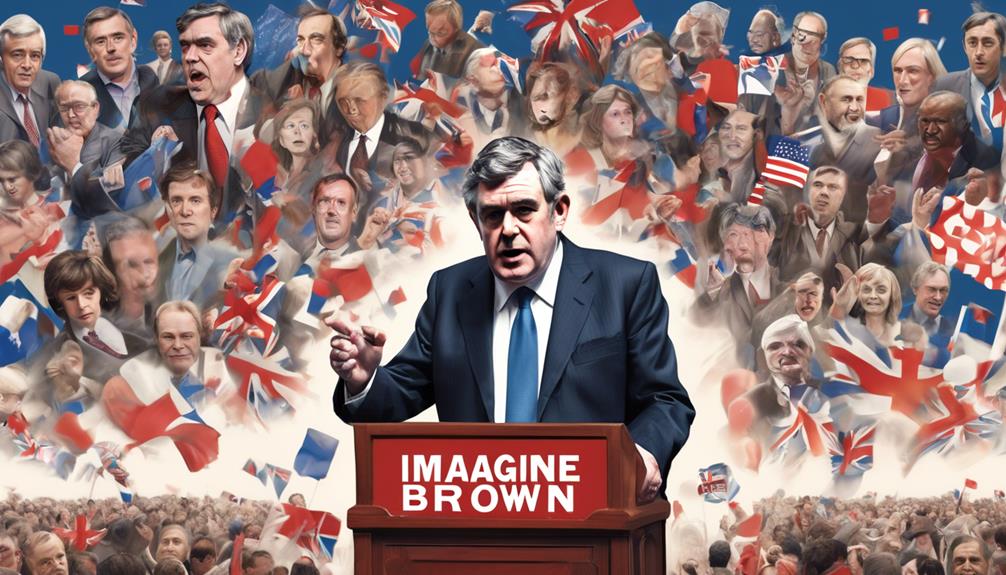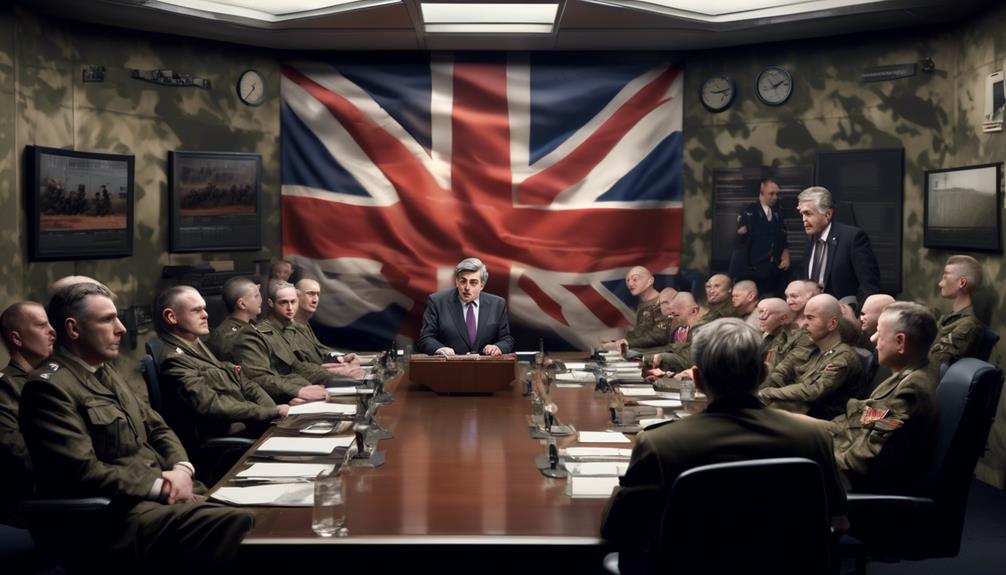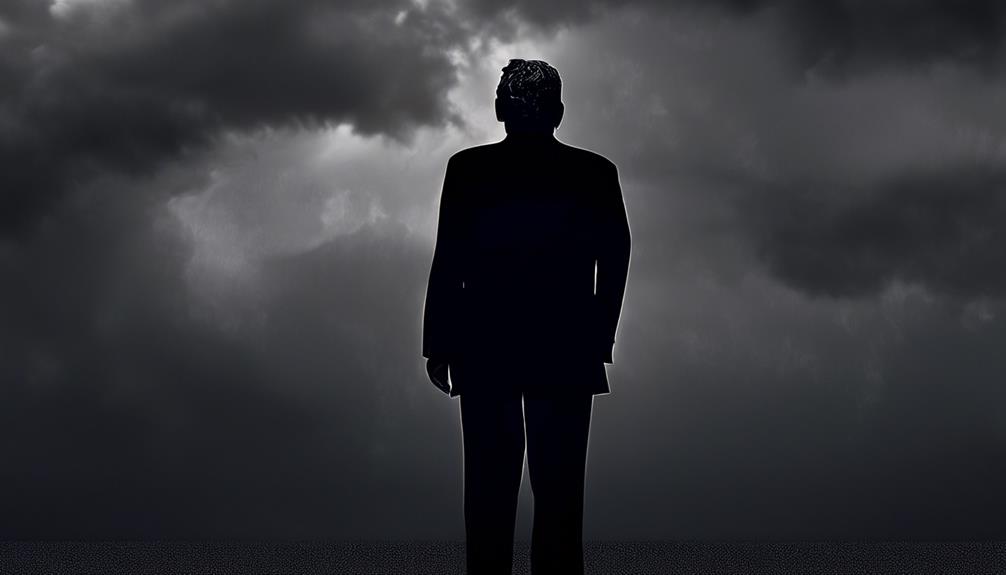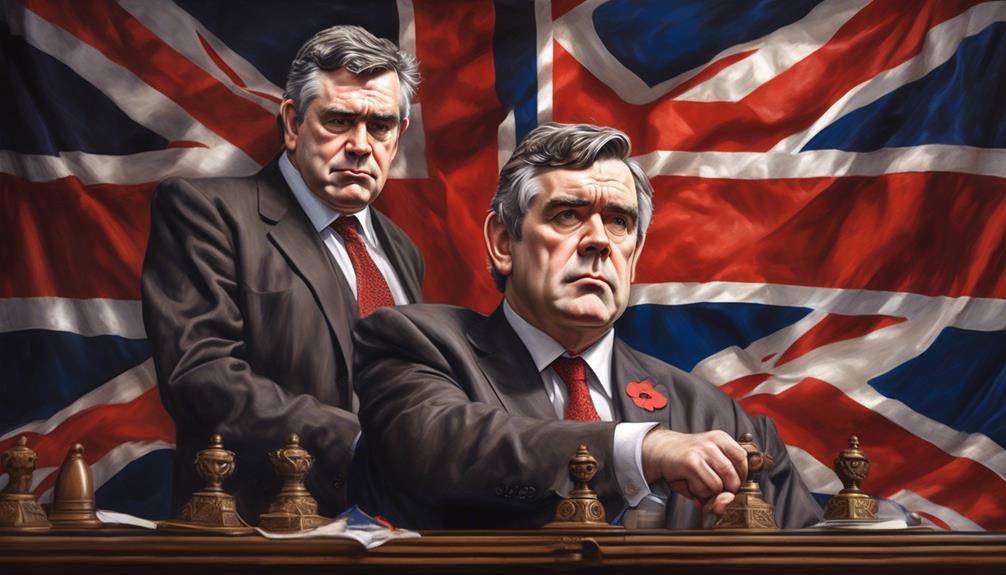As authors, we’re intrigued by the fact that Gordon Brown, the ex-Prime Minister of Britain, has gained recognition for his perceptive observations on a diverse array of subjects. Over his tenure in politics, Brown has expressed his viewpoints on various matters including the economy, social equity, education, international governance, democratic values, the rights of women, Brexit, among others. His commentary has struck a chord with numerous individuals, establishing him as an esteemed personality in the realm of global affairs.
With a legacy of leadership and resilience, Brown's impact on British politics cannot be understated. In this article, we will explore some of his notable quotes, offering a glimpse into the mind of a statesman who has left an indelible mark on the world stage.
Key Takeaways
- Gordon Brown emphasized the importance of a coordinated global response to the financial crisis.
- He advocated for fiscal stimulus measures and regulatory reforms to stabilize the global economy.
- Brown supported increased government spending and tax cuts to stimulate economic growth.
- He believed in creating a society where wealth and opportunities are more evenly distributed and advocated for policies that address income inequality and provide equal access to quality education.
The Economy and Financial Crisis
During his tenure as Prime Minister, Gordon Brown made several notable statements regarding the economy and the financial crisis. Brown emphasized the importance of economic recovery and implementing effective fiscal policies to address the challenges posed by the crisis.
One of Brown's key statements centered around the need for a coordinated global response to the financial crisis. He argued that countries should work together to implement fiscal stimulus measures and regulatory reforms to stabilize the global economy. Brown believed that cooperation was essential for achieving a sustainable economic recovery.
In terms of fiscal policy, Brown advocated for a combination of increased government spending and tax cuts to stimulate economic growth. He argued that targeted investments in infrastructure, education, and technology could create jobs and boost productivity.
Brown also stressed the importance of maintaining financial stability through effective regulation and oversight of the banking sector.
Social Justice and Equality

When it comes to social justice and equality, Gordon Brown emphasizes the importance of economic redistribution and fairness in education.
Brown believes in creating a society where wealth and opportunities are more evenly distributed, ensuring that everyone has a fair chance to succeed.
He advocates for policies that address income inequality and provide equal access to quality education, aiming to level the playing field and create a more just and equitable society for all.
Economic Redistribution
Economic redistribution, a key aspect of social justice and equality, aims to address economic disparities and promote a more equitable distribution of resources within a society. It seeks to reduce the concentration of wealth and ensure that all individuals have access to basic necessities and opportunities for upward mobility. Here are four reasons why economic redistribution is important:
- Reducing poverty and inequality: By redistributing wealth, economic redistribution helps alleviate poverty and narrow the wealth gap, creating a fairer society.
- Promoting social stability: Unequal distribution of resources can lead to social unrest. Economic redistribution aims to create a more stable society by ensuring that everyone has a stake in its success.
- Enhancing economic growth: By providing equal opportunities, economic redistribution can lead to a more productive workforce and stimulate economic growth.
- Fostering social cohesion: When everyone has a fair chance to succeed, it fosters a sense of belonging and cohesion within society.
Economic redistribution, therefore, plays a crucial role in achieving social justice and equality by addressing economic disparities and creating a more equitable society.
Fairness in Education
Fairness in education is a fundamental aspect of social justice and equality. It ensures that all individuals have equal access to quality educational opportunities. Education reform plays a crucial role in promoting equality in schools. It involves implementing policies and initiatives that aim to address disparities in educational resources, opportunities, and outcomes among students.
By prioritizing fairness, education systems can work towards creating a level playing field. This means that every student has the chance to succeed regardless of their background or circumstances. Achieving this goal requires providing adequate funding for schools in disadvantaged areas. It also involves offering targeted support for students who need it and promoting inclusive practices that value diversity.
Achieving equality in schools requires ongoing commitment and collaboration from policymakers, educators, and communities. It is important to ensure that every child has the opportunity to reach their full potential.
Education and Youth Empowerment
In our pursuit of empowering the youth and fostering a brighter future, education stands as an essential catalyst for transformation and growth.
Here are four key reasons why education reform is crucial for youth empowerment:
- Enhancing Skills: Education equips young people with the necessary knowledge and skills to navigate the complexities of the modern world. It provides them with the tools to think critically, solve problems, and communicate effectively, empowering them to seize opportunities and contribute meaningfully to society.
- Breaking the Cycle of Poverty: Education has the power to break the cycle of poverty by providing equal opportunities for all. By ensuring access to quality education for every child, regardless of their background, we can create a more equitable society and empower young people to overcome socio-economic barriers.
- Promoting Social Cohesion: Education promotes social cohesion by fostering understanding, tolerance, and respect among diverse communities. It equips young people with the knowledge and empathy necessary to engage in constructive dialogue, bridge divides, and work towards a more inclusive and harmonious society.
- Building Future Leaders: Education plays a vital role in nurturing the next generation of leaders. By providing young people with the tools and resources to pursue their passions and ambitions, education empowers them to become active citizens, change-makers, and advocates for positive change.
Global Leadership and International Relations

When it comes to global leadership and international relations, Gordon Brown emphasizes the importance of diplomatic negotiations and partnerships.
He believes that by fostering strong relationships with other nations, we can effectively address global challenges and find mutually beneficial solutions.
Additionally, Brown stresses the significance of economic cooperation and development, recognizing that a thriving global economy is essential for promoting stability and prosperity worldwide.
Diplomatic Negotiations and Partnerships
Through diplomatic negotiations and partnerships, global leaders engage in collaborative efforts to address international challenges and foster mutual understanding. Here are four key ways in which diplomatic negotiations and partnerships play a crucial role in international diplomacy and conflict resolution:
- Mediation: Global leaders act as mediators, facilitating dialogue and negotiations between conflicting parties to find common ground and resolve conflicts peacefully.
- Multilateralism: Diplomatic negotiations and partnerships enable global leaders to engage in multilateral forums and organizations, where they work together to address global issues such as climate change, terrorism, and trade disputes.
- Peacekeeping: Through partnerships and alliances, global leaders contribute troops and resources to peacekeeping missions, promoting stability and security in conflict-affected regions.
- Economic Cooperation: Diplomatic negotiations and partnerships also focus on economic cooperation, fostering trade agreements and investment partnerships that benefit all parties involved and contribute to global economic growth.
Economic Cooperation and Development
After discussing the crucial role of diplomatic negotiations and partnerships in international diplomacy and conflict resolution, we now turn our attention to the subtopic of Economic Cooperation and Development in the context of global leadership and international relations. Economic integration and international cooperation play a vital role in promoting sustainable development and fostering global prosperity. In today's interconnected world, countries are increasingly realizing the importance of working together to address common economic challenges and pursue shared goals. Economic cooperation allows nations to pool resources, expertise, and technologies, leading to increased trade, investment, and innovation. It also helps in tackling global issues such as poverty, inequality, and climate change. To illustrate the significance of economic cooperation, consider the following table that highlights some key international organizations and agreements focused on promoting economic integration and fostering collaboration among nations:
| Organization/Agreement | Objective | Member Countries |
|---|---|---|
| World Trade Organization (WTO) | Facilitate global trade and resolve trade disputes | 164 |
| International Monetary Fund (IMF) | Promote financial stability and economic growth | 190 |
| Organisation for Economic Co-operation and Development (OECD) | Promote policies to improve social and economic well-being | 38 |
| European Union (EU) | Foster economic and political integration among European countries | 27 |
These organizations and agreements serve as platforms for countries to come together, exchange ideas, and work towards common economic objectives. They provide a framework for cooperation, helping nations navigate challenges and seize opportunities in an increasingly interconnected world. Economic cooperation and development are essential components of global leadership, enabling nations to harness their collective potential for the betterment of all.
Democracy and Political Governance

In discussing democracy and political governance, Gordon Brown emphasizes the importance of citizen participation and accountability in shaping a fair and inclusive society. Here are four key points that highlight his views on this topic:
- Democratic institutions: Brown believes that strong democratic institutions are essential for political governance. These institutions provide a framework for decision-making and ensure that power is distributed fairly among different branches of government.
- Political participation: According to Brown, active political participation is crucial for a healthy democracy. He encourages citizens to get involved in the political process by voting, joining political parties, and engaging in public debates to shape policies and hold leaders accountable.
- Civic engagement: Brown emphasizes the significance of civic engagement in democratic societies. He believes that citizens should actively participate in community organizations, volunteer work, and other activities that contribute to the well-being of their communities.
- Accountability: Brown stresses the importance of holding political leaders accountable for their actions. He believes that transparency, integrity, and ethical behavior should be the foundation of political governance, ensuring that leaders are answerable to the people they serve.
Climate Change and Environmental Sustainability

Climate change and environmental sustainability are pressing global issues that require urgent action and collective efforts from all nations.
As Prime Minister, Gordon Brown recognized the importance of tackling these challenges head-on and advocated for climate change solutions and environmental activism. Brown emphasized the need for international cooperation to address climate change, stating that 'no country can tackle this problem alone.' He called for a global agreement to reduce greenhouse gas emissions and promote the transition to renewable energy sources.
Brown also highlighted the economic opportunities that arise from addressing climate change, such as the creation of green jobs and the development of clean technologies. He urged governments, businesses, and individuals to take responsibility for their environmental impact and embrace sustainable practices.
Brown's stance on climate change and environmental sustainability reflected his belief in the interconnectedness of environmental, social, and economic issues. He recognized that by working together, we can create a more sustainable and resilient future for generations to come.
Healthcare and Public Welfare

With the pressing global issues of climate change and environmental sustainability addressed, Gordon Brown also prioritized the subtopic of healthcare and public welfare during his time as Prime Minister. Here are four key points about his approach to these areas:
- Strengthening the public healthcare system: Brown recognized the importance of a robust and accessible healthcare system for the wellbeing of the entire nation. He focused on increasing funding for the National Health Service (NHS) to improve patient care, reduce waiting times, and enhance access to healthcare services.
- Expanding welfare programs: Brown believed in creating a safety net for the most vulnerable members of society. He introduced policies to expand welfare programs, providing support to low-income families, individuals with disabilities, and the elderly. These initiatives aimed to alleviate poverty, reduce inequality, and ensure that everyone had the opportunity to lead a dignified life.
- Investing in preventative healthcare: Brown emphasized the significance of preventive measures in promoting public health. He allocated resources towards initiatives that focused on disease prevention, health education, and early intervention. By prioritizing preventive healthcare, he aimed to reduce the burden on the healthcare system and improve overall population health.
- International cooperation for global health: Brown recognized that healthcare challenges extended beyond national borders. He advocated for increased international collaboration to address global health issues, such as infectious diseases and access to essential medicines. He worked towards strengthening partnerships with other countries and international organizations to tackle these challenges collectively.
Through his focus on the public healthcare system and welfare programs, Gordon Brown aimed to improve the overall health and well-being of the British population, promote social equality, and contribute to global health initiatives.
Human Rights and Social Inclusion

Gordon Brown, during his tenure as British Prime Minister, was a strong advocate for human rights and social inclusion. He implemented various initiatives to address these issues and ensure equal opportunities for all individuals.
One of the key highlights of Brown's human rights advocacy was his commitment to international development. He played a pivotal role in increasing aid to developing countries, focusing on poverty reduction and improving access to education and healthcare. By prioritizing these areas, Brown aimed to create a more inclusive society where everyone has the opportunity to thrive.
Additionally, Brown championed social inclusion initiatives within the United Kingdom. He introduced policies to tackle inequality and discrimination, working towards a fairer society. For instance, he implemented legislation to promote gender equality and protect individuals from discrimination based on race, religion, or disability.
Furthermore, Brown emphasized the importance of education in promoting social inclusion. He introduced measures to improve education standards, particularly in disadvantaged areas, aiming to provide equal opportunities for all children to succeed.
Innovation and Technological Advancement

During his time as Prime Minister, Gordon Brown embraced innovation and technological advancement as catalysts for economic growth and societal progress. Here are four key points that highlight Brown's views on the future of innovation and the role of technological disruption:
- Embracing Technological Disruption: Brown recognized that technological disruptions have the potential to revolutionize industries and drive economic growth. He believed in harnessing these disruptions to create new opportunities and transform traditional sectors.
- Investing in Research and Development: To stay ahead in the global innovation race, Brown emphasized the importance of investing in research and development. He understood that funding and supporting scientific research would lead to breakthroughs and drive innovation in various sectors.
- Promoting Digital Skills: Brown recognized the vital role of digital skills in the future economy. He advocated for policies that encouraged digital literacy and provided training opportunities for individuals to adapt and thrive in the digital age.
- Collaboration and Partnerships: Brown believed in the power of collaboration between government, academia, and the private sector. He encouraged partnerships to foster innovation and drive technological advancements that benefit society as a whole.
Brown's vision for the future of innovation and technological advancement was centered around embracing disruption, investing in research and development, promoting digital skills, and fostering collaboration. He understood that by harnessing the power of technology, societies can unlock new opportunities and drive economic growth.
Immigration and Multiculturalism

When discussing immigration and multiculturalism, it's important to consider the debate between assimilation and cultural diversity. Some argue that immigrants should fully assimilate into the dominant culture, while others advocate for preserving and celebrating cultural differences.
Additionally, the economic impact of immigration is a key point of discussion, as it can affect job markets and public resources.
Lastly, the challenges of multiculturalism, such as fostering social cohesion and addressing cultural tensions, must be taken into account.
Assimilation Vs. Cultural Diversity
In the ongoing debate on immigration and multiculturalism, the question of whether assimilation or cultural diversity should be prioritized remains a contentious issue. Here are four key points to consider:
- Assimilation challenges: Advocates for assimilation argue that it promotes social cohesion and national unity. However, there are challenges in achieving full assimilation, such as language barriers, discrimination, and loss of cultural identity.
- Cultural integration approaches: Supporters of cultural diversity emphasize the importance of preserving different cultural traditions and values. They argue that cultural integration can be achieved through policies that promote inclusivity, tolerance, and respect for diversity.
- Benefits of assimilation: Proponents of assimilation believe that it helps immigrants fully participate in the host society, leading to better economic opportunities, social mobility, and overall societal harmony.
- Advantages of cultural diversity: Those in favor of cultural diversity argue that it enriches society by bringing different perspectives, knowledge, and skills. It fosters creativity, innovation, and intercultural understanding.
Ultimately, finding a balance between assimilation and cultural diversity is crucial to creating inclusive and harmonious societies.
Economic Impact of Immigration
The discussion on the economic impact of immigration within the context of immigration and multiculturalism brings attention to the potential benefits and challenges that arise from the integration of immigrants into the host society's economy.
When considering the economic benefits of immigration, it's important to recognize the contributions that immigrants can make to a country's workforce and overall productivity. Immigrants often bring new skills, ideas, and entrepreneurial spirit, which can stimulate economic growth and innovation.
Additionally, cultural integration plays a crucial role in fostering economic benefits. By embracing diversity and creating inclusive environments, societies can tap into the cultural knowledge and experiences of immigrants, leading to greater creativity and competitiveness in various industries.
However, it's also important to acknowledge the challenges that come with economic integration, such as potential competition for jobs and strain on public resources. Thus, a balanced approach is necessary to maximize the economic benefits while addressing the challenges.
Challenges of Multiculturalism
One of the challenges of multiculturalism, particularly in relation to immigration, is the need for effective integration and social cohesion. To address this, we must consider the following four integration challenges:
- Cultural identity: Immigrants often face the challenge of balancing their cultural identity with the need to assimilate into the host society. It's important to create an environment that allows individuals to maintain their cultural heritage while fostering a sense of belonging.
- Language barriers: Language plays a crucial role in integration. Providing language education and support services can help immigrants overcome communication barriers and actively participate in society.
- Discrimination and prejudice: Immigrants may encounter discrimination and prejudice, which can hinder their integration process. Promoting tolerance, diversity, and equal opportunities is essential to create an inclusive society.
- Access to resources: Ensuring that immigrants have equal access to education, healthcare, housing, and employment opportunities is vital for their successful integration and social cohesion.
Addressing these challenges requires a comprehensive approach that focuses on integration policies, community engagement, and support systems to foster an inclusive and harmonious multicultural society.
National Security and Defense

Enhancing national security and defense is crucial in safeguarding the well-being and interests of our nation. As a nation, we must develop a comprehensive national security strategy that addresses the evolving threats we face in today's world. This strategy should encompass all aspects of our defense capabilities, including military, intelligence, and cybersecurity.
To effectively implement our national security strategy, it's essential to allocate sufficient resources to our defense budget. Adequate funding allows us to modernize our military equipment, invest in research and development, and provide our armed forces with the necessary training and support. By prioritizing defense budget allocation, we ensure that our military remains strong and capable of protecting our nation's interests at home and abroad.
Furthermore, a robust defense capability not only deters potential aggressors but also enhances our diplomatic standing and credibility on the global stage. It sends a clear message that we're committed to defending our national sovereignty and safeguarding the security of our citizens.
Women's Rights and Gender Equality

Promoting gender equality and protecting women's rights is essential for creating a fair and inclusive society. Here are four key points to consider regarding women's rights and gender equality:
- Gender Pay Gap: Despite progress, women continue to face significant disparities in wages compared to men. Addressing the gender pay gap requires implementing policies that ensure equal pay for equal work, promoting transparency in salary negotiations, and challenging gender stereotypes that contribute to wage inequality.
- Women in Leadership: Achieving gender equality also means increasing women's representation in leadership positions. Encouraging and supporting women to pursue leadership roles in politics, business, and other sectors is crucial for breaking down barriers and challenging gender biases that hinder women's progress.
- Equal Opportunities: Gender equality goes beyond addressing wage disparities and leadership representation. It also involves providing equal opportunities for education, healthcare, and professional development. Removing gender-based barriers and biases is essential for empowering women to reach their full potential and contribute to society.
- Ending Gender-Based Violence: Women's rights and gender equality can't be achieved without addressing gender-based violence. Implementing comprehensive measures to prevent and respond to violence against women is crucial. This includes strengthening legal frameworks, providing support services for survivors, and promoting education and awareness to change societal attitudes towards violence.
Brexit and European Union Relations

Brexit and its implications for European Union relations have sparked significant debates and challenges in recent years. The Brexit negotiations and the consequences of EU membership withdrawal have had a profound impact on both the United Kingdom and the European Union. The process of negotiating the terms of the UK's departure from the EU has been complex and contentious, with issues such as trade, immigration, and the Irish border being particularly contentious.
One of the main challenges that Brexit has posed for EU relations is the uncertainty it has created. The UK's decision to leave the EU has created a sense of instability and unpredictability within the European Union, as member states grapple with the implications of a major member state leaving the bloc. This has led to tensions and disagreements among EU leaders, as they try to navigate the complex negotiations and find a way forward.
The consequences of Brexit for EU membership have also been significant. The UK's departure from the EU has raised questions about the future of the European project and the stability of the EU as a whole. It has also had economic consequences, with both the UK and the EU experiencing economic disruptions as a result of the uncertainty surrounding Brexit.
Leadership and Resilience

When it comes to leadership and resilience, Gordon Brown's quotes offer valuable insights.
One of the key points is the importance of strength in adversity. Brown emphasizes that true leaders are those who can navigate through challenges with determination and perseverance, inspiring others along the way.
These quotes shed light on the qualities needed to lead effectively and remain resilient in the face of obstacles.
Strength in Adversity
Despite facing numerous challenges and setbacks, leaders who exhibit strength in adversity demonstrate resilience and inspire others to persevere. This ability to overcome obstacles and find inner strength is a crucial trait for effective leadership.
Here are four key aspects of strength in adversity:
- Emotional resilience: Leaders with strength in adversity can manage their emotions in difficult situations, allowing them to stay focused and make rational decisions.
- Perseverance: They've the determination to keep pushing forward, even when faced with setbacks or failures.
- Adaptability: These leaders are flexible and able to adjust their strategies in response to changing circumstances, ensuring they can navigate through adversity successfully.
- Positive mindset: They maintain a positive outlook, seeing challenges as opportunities for growth and learning rather than as insurmountable obstacles.
Inspiring Others Through Challenges
Leaders who demonstrate resilience in the face of challenges inspire others to overcome obstacles and stay motivated towards achieving success. The ability to overcome adversity and persevere through difficult times is a quality that not only defines effective leaders but also inspires those around them.
When leaders show strength and determination in the face of challenges, it sends a powerful message to their team members, encouraging them to push through their own obstacles. By leading by example, these leaders create an environment that fosters growth, resilience, and a can-do attitude. They understand that setbacks are a natural part of any journey but believe in the power of perseverance.
Through their actions and words, they motivate others to keep going, reminding them that success is possible even in the face of adversity.
Legacy and Impact

Gordon Brown's tenure as the Prime Minister of the United Kingdom left a significant and lasting impact on both domestic and international fronts. His policies and actions had far-reaching consequences, particularly in the realm of education. Here are four key points that highlight his legacy and the long-term effects of his decisions:
- Investment in education: Brown prioritized education funding, aiming to provide equal opportunities for all children. His government introduced initiatives such as Building Schools for the Future, which aimed to modernize schools across the country. This increased investment had a positive impact on educational facilities and resources.
- Focus on international education: Brown recognized the importance of education in the global arena. He worked towards increasing access to education for children in developing countries, pushing for the achievement of the Millennium Development Goal of universal primary education.
- Higher education reforms: Brown implemented measures to widen access to higher education, particularly through the introduction of tuition fee caps and increased financial support for disadvantaged students. These reforms aimed to create a more inclusive and accessible higher education system.
- Long-term consequences: Brown's emphasis on education has had lasting effects. The investments made during his tenure have improved educational infrastructure and opportunities, impacting generations of students and shaping the future of the UK's education system.
Frequently Asked Questions
What Is Gordon Brown's Favorite Book?
Gordon Brown's favorite book isn't known.
As for his siblings, Gordon Brown has one brother.
How Many Siblings Does Gordon Brown Have?
When it comes to Gordon Brown's family, there's a lot to uncover. We dug deep into his childhood and discovered that he has siblings. Although we don't have the exact number, we can imagine the lively household that Brown grew up in. It must have been a whirlwind of laughter, fights, and sibling shenanigans.
Perhaps these early experiences played a role in shaping the man who would later become the British Prime Minister.
What Is Gordon Brown's Favorite Sport?
Football is Gordon Brown's favorite sport. As a collective, we find it interesting that a political figure like him has a passion for a physical activity. It shows that he values staying active and enjoying leisure time.
Additionally, it's worth mentioning that his favorite hobby is playing the piano. This reveals a diverse range of interests and talents beyond his political career. It's always inspiring to see leaders engage in different activities outside their professional lives.
What Is Gordon Brown's Favorite Food?
Gordon Brown's favorite food isn't mentioned in the context provided. However, his favorite sport, number of siblings, favorite book, and whether or not he's any pets are discussed in the previous questions.
It's interesting to explore the personal preferences of public figures like Brown as it humanizes them.
We'll need further information to answer the specific question about his favorite food.
Does Gordon Brown Have Any Pets?
Gordon Brown's relationship with animals and his hobbies and interests aren't well-known without the context of Gordon Brown Quotes – British Prime Minister. However, it's possible that he may have pets or be interested in animals based on his personal preferences.
To find out more about his relationship with pets and his hobbies, it would be best to refer to reliable sources or interviews with Gordon Brown himself.
What is the Difference Between the Quotes of Gordon Brown and Tony Blair as British Prime Ministers?
Both Gordon Brown and Tony Blair made significant contributions as British Prime Ministers, but their quotes reflect different approaches. While Blair’s prime minister quotes often focused on foreign policy and international relations, Brown’s quotes tended to emphasize domestic issues and economic policies.
Conclusion
Gordon Brown's quotes highlight his strong stance on:
- Economic stability
- Social justice
- Education
- Global leadership
- Democracy
- Women's rights
- Brexit
- Leadership
His powerful words resonate with the audience, showcasing his commitment to creating a better world. Brown's legacy will forever be remembered for his resilience and determination in tackling the challenges of his time.
His quotes serve as a reminder of his influential leadership and the lasting impact he's had on British politics.
Joy, as our Editor in Chief, ensures the highest standard of content. Her talent in writing is complemented by her attention to detail and passion for literature and culture. Joy’s expertise and love for the English language shine through in her editorial work, making each piece a testament to quality and clarity.










